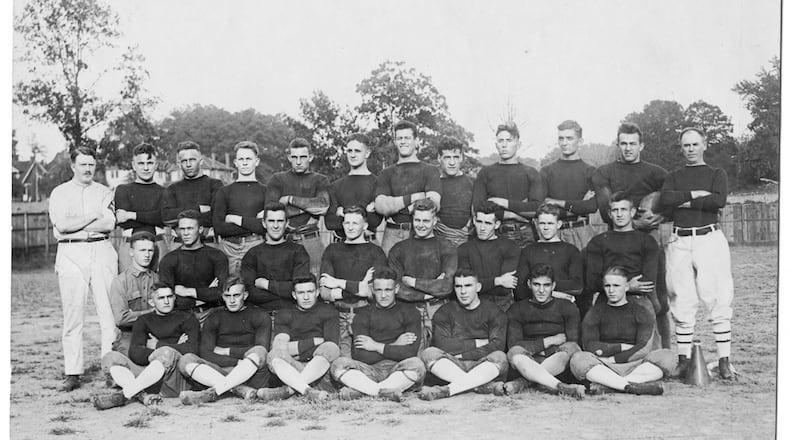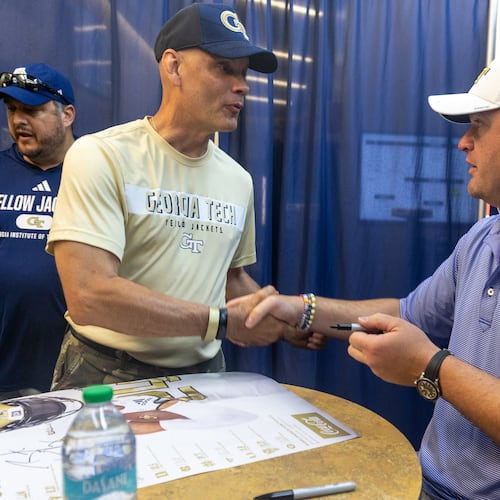The first time that Georgia Tech met Pittsburgh on a football field, it was not merely a game. In the words of an Associated Press story ahead of the game, it was a meeting of “two of the most remarkable football machines in the history of the modern gridiron game.”
Not only that, but the 1918 showdown stirred in the intersectional spice that has made college football so flavorful over the decades. A New York newspaper hailed it as “a test of gridiron ability between the North and the South.” In time, no fewer that nine of the game’s participants would be inducted into the College Football Hall of Fame, including two of the sport’s coaching titans.
The latest meeting between two of college football’s more storied teams – Thursday night at Bobby Dodd Stadium – can be painted only in hues less bold than the first. But they do have something in common beyond the participants. The first Tech-Pitt game, like Thursday’s, was played amid a pandemic.
In the fall of 1918, the U.S. – and the world – was grappling with the Spanish flu pandemic, which has been estimated to have caused the deaths of 50 million people worldwide, including 675,000 in the U.S. At the same time, World War I was reaching its brutal end, having claimed the lives of roughly 9 million soldiers and another 10 million civilians, with some estimates reaching higher.
In the U.S., college football played on, with, familiarly, games being postponed, canceled and re-scheduled on the fly.
“It requires a Philadelphia lawyer with no signs of color blindness, a steady eye and a pair of binoculars to keep straight the ever-changing football dates of this interesting season,” Atlanta Constitution sports writer J.H. McKee wrote.
The following might resonate with Virginia and Clemson fans bristling over their teams having traveled to Tallahassee, Fla., only for their teams not to be able to play Florida State. The week before the Tech-Pitt game, the Golden Tornado (as the team was known) were to play soldiers from Camp Gordon, located on the site of what is now DeKalb-Peachtree Airport (college teams often played teams representing army training bases as a fallback for not being able to play other colleges).
On the day of the game, the Camp Gordon team and several hundred of its fans showed up to Grant Field only to learn that Tech had called off the game. According to a story in the Constitution the following day, Tech’s chief medical officer had determined that the condition of the field and the weather made for hazardous conditions and warranted the game being called off.
Unfortunately, the camp athletic director and coach could not be reached by phone, so school officials could only wait until they arrived.
A game between Tech and Pitt was not scheduled before the season, but the public itched for a showdown. McKee wrote that the matchup was “what football fans have been waiting for for some years.”
Anticipation for Tech-Pitt was high. Led by coach John Heisman, Tech was recognized as the national champion from 1917 – the first time a team from the South had earned that crown – and had continued to roll through its 1918 schedule. The Golden Tornado entered the season rolling on a 28-game unbeaten streak, a run that included the famous 222-0 defeat of Cumberland in 1916. Of the 28 games, 18 were shutouts.
Pittsburgh had been recognized as the 1916 national champion under the direction of coach Pop Warner. The Panthers’ win streak was at 28 as the 1918 season began. They outscored the opposition 260-31 in 1917 for a 10-0 record.
The game came together in late October as a benefit for the United War Work campaign, with the proceeds supporting U.S. soldiers stationed abroad after World War I. It was to be played Nov. 23 at Forbes Field in Pittsburgh.
Tech continued to bludgeon opponents in 1918, winning its first five games by a combined 425-0. By coincidence, Tech’s opponent just before Pitt was the same as the present-day Yellow Jackets – N.C. State. The 1918 Tech team fared better, handing the school then known as North Carolina A&E a 128-0 defeat.
On the day that Tech’s Nov. 16 game with Camp Gordon was canceled – a week before the Tornado’s matchup with Pitt – Heisman wasn’t even in Atlanta. He was scouting the Panthers’ 37-0 defeat of Penn.
The historic nature of the meeting is difficult to overstate. Neither team had lost since 1914. The teams were coached by men who, even then, were considered giants of the game. Heisman is credited with legalizing the forward pass and Warner for inventing the single wing.
“That really was the offense for college football for 30 some years,” said Kent Stephens, historian at the College Football Hall of Fame.
No fewer than nine participants in the game – four on Pitt’s side (Tom Davies, George McLaren, Herb Stein and Warner) and five on Tech’s (Bill Fincher, Buck Flowers, Joe Guyon, Heisman and his assistant coach William Alexander) – would be College Football Hall of Fame inductees.
The Constitution turned to West Virginia coach and athletic director Harry Stansbury to pen a guest column in advance of the game.
“The Pitt-Georgia Tech game, in spite of wartime conditions, will prove to be one of the greatest gridiron encounters ever staged in America,” Stansbury wrote.
As it turned out, however, the game was a bit of a dud. Before a crowd of about 33,000 – then a record for a sporting event in western Pennsylvania – Pitt won 32-0 on a muddy track. Davies ran for two touchdowns, threw for two more and set up the fifth. Davies also “was a demon on defense” the Constitution wrote, “and his great speed and his tackling ability was responsible for the breaking up of the Jackets’ sweeping end runs.” He also kicked two extra points.
“Tech met a better eleven, and like the true sportsmen that they are, they manfully admit defeat,” the Constitution’s Dick Jemison wrote.
Tech returned home to play Auburn on Thanksgiving. Like today’s Jackets, the Tornado played the game on short rest. While it lost its final game of the season to the Cleveland Naval Reserves, Pitt was recognized as national champion.
Perhaps someday Tech and Pitt will play a game as meaningful as the 1918 game. But it may be awhile.
About the Author
Keep Reading
The Latest
Featured



